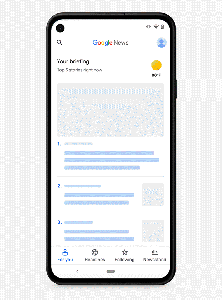Google has long had a frenemy position with the world of news: it can direct a lot of traffic to online publishers, but that’s only if people bother to click on links after getting the gist of the story from Google itself (and that’s before considering the AMP approach on mobile that keeps users on Google URLs after they click). Publications built around advertising have felt beholden to the search and ad giant, leading some of them to try to forge alternative revenue models, around paid content, events, and more to offset that dependency.
Now Google is offering another, complementary, option to them.
Today the company unveiled its latest effort to claw back more credibility in the news publishing world, with the announcement of Google News Showcase. Sundar Pichai, CEO of the search giant, said in a blog post that it would collectively pay some $1 billion to news publishers “to create and curate high-quality content” for new story panels that will appear on Google News — initially on Android devices and soon also on Google News on iOS. The new initiative is going live today, after it was initially unveiled by Google in broad strokes earlier this summer.
Google News Showcase is rolling out first in Germany and Brazil before expanding to other markets, according to Pichai. The company has already inked deals with 200 publications in Germany, Brazil, Argentina, Canada, the U.K. and Australia. The first publications to launch will be Der Spiegel, Stern, Die Zeit, Folha de S.Paulo,Band, Infobae, El Litoral, GZH, WAZ and SooToday. India, Belgium and the Netherlands will be next on the list for expansions after the other countries go live, Pichai said.

As you can see here, the effort seems primarily to be focused on how news is consumed on mobile devices rather than desktop computers.
Like Apple with its efforts around Apple News, as a major mobile platform operator Google has worked on a number of efforts to play nice with publishers and the news publishing industry over the years, some on its own steam and some in response to pressure from others.
They have included funding local news research initiatives; its $300 million news initiative that includes providing grants to journalists and journals, as well as research; emergency grants to publications in hot water; and building tools to help journalists do their work.
Picking Germany as one of the first markets to roll this out is notable, given that publishers in the country were involved in a years-long lawsuit over copyright fees related to how their content was repurposed in Google. Google ultimately won the case in court, but perhaps not the moral, principled high ground. So, given that Google continues to face a lot of antitrust scrutiny in Europe and elsewhere, it’s important that it works (or at least appear to work!) on rehabilitating its image as too-powerful and uninterested in the fate of institutions that are central to how democratic society works, like the free press.
As Pichai notes, this latest effort is different from what Google has built before because it’s based on publishers doing the curating and creating themselves.
Google is infamous for starting a lot of projects, rolling them out, and then abandoning them when they fail to get market traction. It has in theory committed to the Showcase for three years, but Pichai said the plan is for it to “extend beyond the initial three years”, with the company “focused on contributing to the overall sustainability of our news partners around the world.”
It’s not clear how much individual publishers will make out of this initiative, and how or if it could be used to drive business models that don’t cut Google in on the action, which has been a prime focus for many publishers. At best, similar to Apple News, it will help them hedge their bets or bolster them, rather than cannibalize those other efforts. Google, at the least, seems aware of the stakes:
“The business model for newspapers—based on ads and subscription revenue—has been evolving for more than a century as audiences have turned to other sources for news, including radio, television and later, the proliferation of cable television and satellite radio,” wrote Pichai. “The internet has been the latest shift, and it certainly won’t be the last. Alongside other companies, governments and civic societies, we want to play our part by helping journalism in the 21st century not just survive, but thrive.”


No comments:
Post a Comment